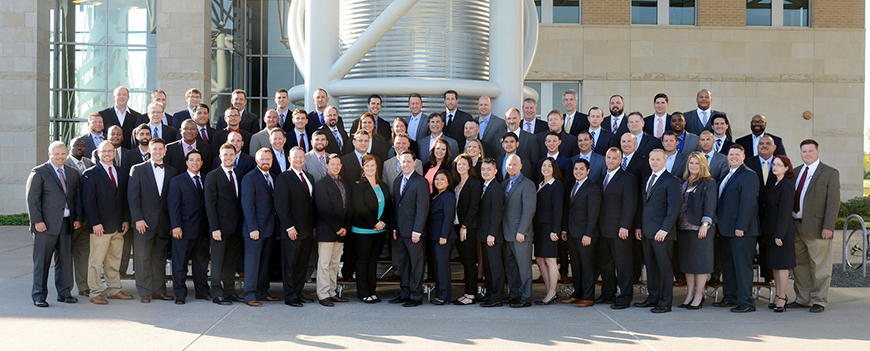
Shown above are MID students during their two on-campus residency weeks.
A graduate level, distance education course in the Dwight Look College of Engineering at Texas A&M University has achieved a Quality Matters certification, becoming the first engineering course at Texas A&M to receive this recognition.
Quality Matters is a nationally recognized, faculty-centered, peer review process designed to certify the quality of online and blended courses.
The course that was certified — IDIS 624, or Strategic Relationships for Industrial Distribution — is one of 10 courses that make up the Master of Industrial Distribution (MID) degree. Aside from the two on-campus residency weeks, the entire masters degree is completed online, creating a more accessible pathway for professionals who wish to further their education and careers.
Bharani Nagarathnam, associate director of the MID program, said one other MID course is entering the Quality Matters certification process now, and three other courses are under informal review.
“Our goal is to get all of our 10 courses certified by fall 2016 and be the first and only degree program at Texas A&M to be Quality Matters certified,” Nagarathnam said.
IDIS 624 is the first graduate course to be certified at Texas A&M and the fifth course overall across the university. Dr. Malini Natarajarathinam, associate professor in the Department of Engineering Technology and Industrial Distribution, teaches IDIS 624.
“There’s a very big focus in our department to make sure our courses are effective and engaging to professional students,” she said. “Our students are already rearranging their entire lives, their work and professional lives to go to school. We don’t want them to be doing anything that’s not going to be valuable to them.”
The Texas A&M Instructional Technology Service was instrumental in helping with the informal review, suggesting course improvements and managing the formal Quality Matters review process.
The course was reviewed by peers who graded the overall course design on eight quality assurance standards. The course scored 95 out of 99 points.
Amber Muenzenberger, director for remote learning and outreach education, said the informal and formal review process is rigorous.
“This process not only provides professional development for faculty and course improvements, but it also supports the university’s commitment to excellence in teaching regardless of modality,” Muenzenberger said.
Natarajarathinam said the certification process taught her new ways to engage her students in distance education courses. Using message boards, she created an informal, fun environment for the students to get to know each other, furthering their communication and involvement with the class.
“I’ve always been a firm believer that it should be distance education, not distant education,” Natarajarathinam said.
“The certification helps us to demonstrate that our courses are designed specifically for online education and delivered effectively,” Nagarathnam said. “It also helps to reinforce our commitment to quality of education.”